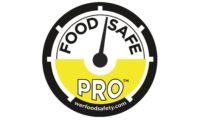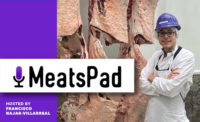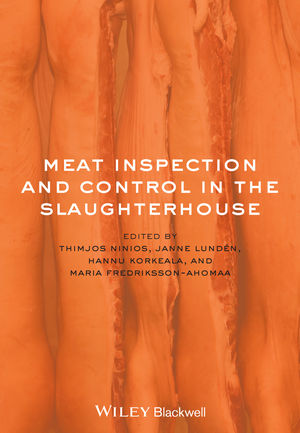The meat science program at Kansas State University is one of the oldest, most well-respected programs in the country. K-State takes great pride in the high quality, well-trained students that graduate from the program and go on to become industry leaders in their respected fields. The meat science program at K-State is a team-oriented, dynamic program, with teaching and research opportunities covering all aspects of meat science. The group is comprised of five faculty members whose expertise, teaching, extension, and research programs encompass all facets of meat science including muscle growth and biology, food safety, meat processing, shelf-life and packaging, processed and value-added meats, meat sensory, color chemistry, and all aspects of fresh meat quality.
Students at K-State are exposed to and engaged in activities ranging from animal harvest through further processing. This allows students to gain hands-on experience across a variety of undertakings and acquire a wide range of skills and knowledge they otherwise would not have developed. This helps students to identify and pursue research areas of focus that they are passionate about. K-State believes one of the primary missions of a meat science program should be to prepare students to be successful in the ever-changing, fast-paced environment of the meat industry. To help them prepare, students are encouraged to take multiple industry internships to gain valuable workplace experience that cannot be replicated in the university environment and are relied upon to help in various teaching and leadership roles within meat science courses.
K-State continually works to serve the meat industry within Kansas and across the nation. Researchers at K-State have worked extensively with industry groups to evaluate a number of “real-world” issues ranging from the effects of fatty acid profile on bacon quality to evaluation of the changes in collagen and muscle cell characteristics related to beef finishing diet. K-State continues to be one of the leading institutions in fresh meat color research. Faculty and graduate students from K-State work to disseminate their research findings through presentations at national and international meetings, as well as publication in multiple high-impact, peer-reviewed journals.
Faculty at Kansas State help serve Kansas through a number of extension and outreach activities. HACCP workshops are hosted annually in conjunction with neighboring land-grant universities to provide meat producers from across the Midwest the tools they need to help ensure a safe food supply. Additionally, K-State hosts the annual Midwest Meat Processing Workshop and coordinates the Kansas Meat Processors Association product show. This event allows producers from across Kansas to learn processing techniques from industry experts as well as sample some of the best meat products from throughout the state.
Dr. John F. Stika, President of Certified Angus Beef LLC, states, “The time I spent at Kansas State University as an undergraduate and meat science graduate student had a profound impact on my career path and effectiveness. The hands-on curriculum and student-centric faculty I experienced provided me with a practical, solution-oriented perspective of the beef community which I still leverage every day when working with producers and consumers alike. I was exposed to several valued mentors in an environment that fostered the development of a meaningful scientific understanding of the meat industry that I feel is necessary today to find answers to the complex issues facing our business and the industry overall.”
Kansas State University is a member of the American Meat Science Association. For more information about Kansas State University and its faculty, please visit the AMSA website at http://www.meatscience.org/students/graduate-programs/kansas-state-university.







Report Abusive Comment